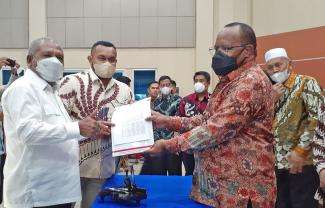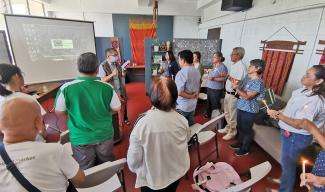Indigenous Peoples in Jayapura Regency of Papua have long struggled to maintain the balance of life in their respective customary areas. Now, with support from local government and the Samdhana Institute, 14 communities in Jayapura, West Papua have been granted official traditional village status, giving them greater control over their lands and agency in their futures.
The news was confirmed on 8 August 2022, following confirmation of the administrative codes by Indonesia’s Directorate General of Community and Village Empowerment (Ditjen PMD) at the Ministry of Home Affairs (Kemendagri). The 14 traditional villages that received administrative area codes were Yoboi Traditional Village, Heaiseai Yomo Heai, Heram Ayapo, Kleuwblou and Yokiwa Traditional Village, along with the traditional villages of Waibron Bano, Ketemung, Bobrongko, Homfolo, Donday, Bambar, Bundru, Nechive and Iwon.
"The establishment of 14 traditional villages in Jayapura Regency is the first time in the history of national recognition of traditional villages and can become an embryo for the development of Indonesian culture," said John Wempi Wetipo, who is the Deputy Minister of Home Affairs, on Thursday, 11 August 2022. He was speaking during the official handing over ceremony at the Ministry, when the new village codes were confirmed to the Regent of Jayapura, Mathius Awoitauw.
It was Awoitauw who originally had the idea of assigning administrative codes to the traditional villages, and he who pioneered the traditional village programme in Jayapura Regency. The idea was put forward in a book entitled ‘Journalistic Reporting on the Movement for the Restoration of Indigenous Peoples' Identity in Jayapura Regency’, written by Jahya Lourentz Marasian and published in 2015. The book outlined a vision for restoring traditional village institutions as part of an overarching mission to restore Jayapura’s identity.
To bring this vision for Papua’s Indigenous Peoples into focus, the Regent of Jayapura has been encouraging cooperation between CSOs/NGOs and the government. He has stated that NGOs have a crucial role to play in advancing the mindset and awareness of Indigenous Peoples in Jayapura Regency, while also advocating access to various regulations – from the regional to the national level. The Samdhana Institute is one of several development partners in Papua that has been working to support this process since 2016.
Samdhana has assisted local governments in submitting traditional village decrees at the provincial and national levels, and has been collaborating with its partners to support activities in the field. This includes assistance in the formation and implementation of local regulations, while also working together with NGOs and local government in Papua to encourage the recognition of traditional villages. This also encompasses the Indigenous Peoples Task Force (GTMA), which, under the supervision of the Customary Territory Registration Agency (BRWA), has carried out area mapping in 50 traditional villages in Jayapura Regency.
Following a mentoring process in these 50 traditional villages, the Ministry of Home Affairs (Kemendagri) handed over administrative codes to 14 villages in Jayapura Regency. Dr. Martua T. Sirait is the Director of Indonesia Operations at the Samdhana Institute. He calls this the beginning of a long road to sovereignty for the Indigenous Peoples of Papua. "The hope is that…traditional villages can provide better welfare to the community and justice,” he says, adding that ‘justice’ in this instance means that “land is not taken carelessly, access to natural resources is distributed fairly and the community can maintain and manage their environment with their traditional wisdom.”
Dr. Sirait is confident the recent developments can be a catalyst for more positive changes in the years ahead. “Yesterday, West Papua Province wanted to follow Jayapura's example, it seems that many regencies or provinces will follow suit," said Sirait, who also encouraged traditional villages in other areas to follow the steps taken by the district in Jayapura. With the pathway forwards established, other districts can now follow in the footsteps of Jayapura.
Read more stories: Kode Registrasi Kampung Adat, Gagasan Bupati Jayapura Demi Kesejahteraan Masyarakat




